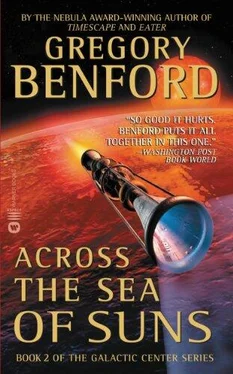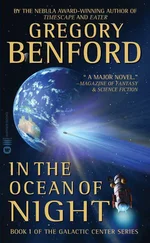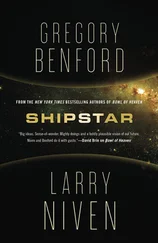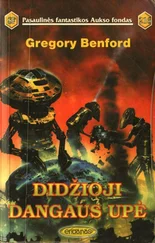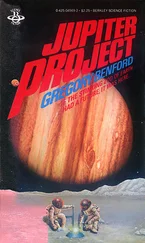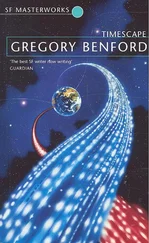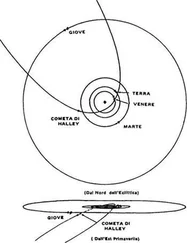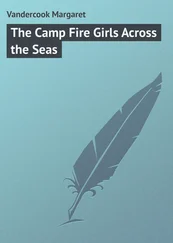Gregory Benford - Across the Sea of Suns
Здесь есть возможность читать онлайн «Gregory Benford - Across the Sea of Suns» весь текст электронной книги совершенно бесплатно (целиком полную версию без сокращений). В некоторых случаях можно слушать аудио, скачать через торрент в формате fb2 и присутствует краткое содержание. Год выпуска: 2007, ISBN: 2007, Издательство: Grand Central Publishing, Жанр: Космическая фантастика, на английском языке. Описание произведения, (предисловие) а так же отзывы посетителей доступны на портале библиотеки ЛибКат.
- Название:Across the Sea of Suns
- Автор:
- Издательство:Grand Central Publishing
- Жанр:
- Год:2007
- ISBN:978-0-446-50634-2
- Рейтинг книги:3 / 5. Голосов: 1
-
Избранное:Добавить в избранное
- Отзывы:
-
Ваша оценка:
- 60
- 1
- 2
- 3
- 4
- 5
Across the Sea of Suns: краткое содержание, описание и аннотация
Предлагаем к чтению аннотацию, описание, краткое содержание или предисловие (зависит от того, что написал сам автор книги «Across the Sea of Suns»). Если вы не нашли необходимую информацию о книге — напишите в комментариях, мы постараемся отыскать её.
Across the Sea of Suns — читать онлайн бесплатно полную книгу (весь текст) целиком
Ниже представлен текст книги, разбитый по страницам. Система сохранения места последней прочитанной страницы, позволяет с удобством читать онлайн бесплатно книгу «Across the Sea of Suns», без необходимости каждый раз заново искать на чём Вы остановились. Поставьте закладку, и сможете в любой момент перейти на страницу, на которой закончили чтение.
Интервал:
Закладка:
The oceanographers and biologists said they were starting to understand the Swarmer mating and attack modes by that time. It was slow work. Studying them on the open water was dangerous. When they were captured they hammered themselves against the walls of their containers until the jutting bone of their foreheads shattered and drove splinters into their brains.
Then the Swarmers began taking bigger ships. They found a way to mass together and hull even the big supertankers.
By then the oceanographers were dying, too, in their reinforced-hull research ships. The Swarmers could sink anything then and no one could explain how they had learned to modify their tactics. The things did not have particularly large brains.
There were reports of strange-looking Swarmers, of strays from the schools, of massed Swarmers who could take a ship down in minutes. Then came photographs of a totally new form, the Skimmers, who leaped and dived deep and were smaller than the Swarmers. The specimens had been killed by probots at depths below two hundred fathoms, where Swarmers had never been seen.
The automatic stations and hunters were the only way men could study the Swarmers by that time. Large cargo vessels could not sail safely. Oil did not move from the Antarctic or China or the Americas. Wheat stayed in the farm nations. The intricate world economy ground down.
Warren had been out of work and stranded in the chaos of Tokyo. His wife had left him years before so he had no particular place to go. When the Manamix advertised that it had special plates in her hull and deck defenses he signed into a berth. The pay was good and there was no other sea work anyway. He could have run on the skimships that raced across the Taiwan Straits or to Korea, but those craft did not need engineers. If their engines ever went out they were finished before any repair could get done because the loud motors always drew the Swarmers in their wake.
Warren was an engineer and he wanted to stick to what he knew. He had worked hard for the rating. The heavy plates in the fore- and aftholds had looked strong to him. But they had buckled inside of half an hour.
Rosa held up well at first. They never saw any other survivors of the Manamix . They snagged more wreckage and logs and lashed it together. Floating with the wood they found a coil of wire and an aluminum railing. He pounded the railing into nails and they made a lean-to for protection from the sun.
They were drifting northwest at first. Then the current shifted and took them east. He wondered if a search pattern could allow for that and find them.
One night he took Rosa with a power and confidence he had not felt since years before, with his wife. It surprised him.
They ate the cans of provisions. He used some scraps for bait and caught a few fish, but they were small. She knew a way to make the twine tight and springy. He used it to make a bow and arrow and it was accurate enough to shoot fish if they came close.
Their water began to run out. Rosa kept their stores under the lean-to and at seven days Warren found the water was almost gone. She had been drinking more than her share.
“I had to,” she said, backing away from him at a crouch. “I can’t stand it, I … I get so bad. And the sun, it’s too hot, I just …”
He wanted to stop but be could not and he hit her several times. There was no satisfaction in it.
Through the afternoon Rosa cringed at a corner of the raft and Warren lay under the lean-to, and thought. In the cool, orderly limits of the problem he found a kind of rest. He squatted on a plank and rocked with the swell, and inside, where he had come to live more and more these past years, the world was not just the gurgle and rush of waves and the bleaching raw edge of salt and sun. Inside there were the books and the diagrams and things he had known. He struggled to put them together:
Chemistry. He cut a small slit in the rubber stopper of a water can and lowered it into the sea on a long fishing line.
The deeper water was cold. He pulled the can up and put in inside a bigger can. It steamed like a champagne bucket. Water beaded on the outside of the small can. The big can held the drops. The drops were free of salt but there was not much.
Nine days out the water was gone. Rosa cried. Warren tried to find a way to make the condensing better but they did not have many cans. The yield was no more than a mouthful a day.
In the late afternoon of that day Rosa suddenly hit him and started shouting filthy names. She said he was a sailor and should get them water and get them to land and when they finally did get picked up she would tell everybody now bad a sailor he was and how they had nearly died because he did not know how to find the land.
He let her run down and stayed away from her. If she scratched him with her long fingernails the wound would heal badly and there was no point in taking a risk. They had not taken any fish on the lines for a long time now and they were getting weaker. The effort of hauling up the cans from below made his arms tremble.
The next day the sea ran high. The raft groaned, rising sluggishly and plunging hard. Waves washed them again and again so it was impossible to sleep or even rest. At dusk Warren discovered jelly sea horses as big as a thumbnail riding in the foam that lapped over the raft. He stared at them and tried to remember what he had learned of biology.
If they started drinking anything with a high salt content the end would come fast. But they had to have something. He put a few on his tongue, tentatively, and waited until they melted. They were salty and fishy but seemed less salty than seawater. The cool moisture seemed right and his throat welcomed it. He spoke to Rosa and showed her and they gathered handfuls of the sea horses until nightfall.
On the eleventh day there were no sea horses and the sun pounded at them. Rosa had made hats for them, using cloth from the wreckage. That helped with the worst of the day, but to get through the hours Warren had to sit with closed eyes under the lean-to, carefully working through the clear hallways of his mind.
The temptation to drink seawater was festering in him, flooding the clean places inside him where he had withdrawn. He kept before him the chain of things to keep himself intact.
If he drank seawater he would take in a quantity of dissolved salt. The body did not need much salt, so it had to get rid of most of what he took in. The kidneys would sponge up the salt from his blood and secrete it. But doing that took pure water, at least a pint a day.
The waves churned before him and he felt the rocking of the deck and he made it into a chant.
Drink a pint of seawater a day. The body turns it into about twenty cubic centimeters of pure water.
But the kidneys need more than that to process the salt. They react. They take water from the body tissues.
The body dries out. The tongue turns black. Nausea. Fever. Death.
He sat there for hours, reciting it, polishing it down to a few key words, making it perfect. He told it to Rosa and she did not understand but that was all right.
In the long afternoon he squinted against the glare and the world became one of sounds. The rattling of their cans came to him against the murmur of the sea and the hollow slap of waves against the underside of the raft. Then there was a deep thump. He peered to starboard. A rippling in the water. Rosa sat up. He gestured for silence. The planks and logs creaked and worked against each other and the thump came again.
He had heard dolphins knocking under the raft before and this was not their playful string of taps. Warren crawled out from the lean-to and into the yellow sunlight and a big green form broke surface and rolled belly-over, goggling at them with a bulging eye, its mouth was like a slash in the blunt face. The teeth were narrow and sharp.
Читать дальшеИнтервал:
Закладка:
Похожие книги на «Across the Sea of Suns»
Представляем Вашему вниманию похожие книги на «Across the Sea of Suns» списком для выбора. Мы отобрали схожую по названию и смыслу литературу в надежде предоставить читателям больше вариантов отыскать новые, интересные, ещё непрочитанные произведения.
Обсуждение, отзывы о книге «Across the Sea of Suns» и просто собственные мнения читателей. Оставьте ваши комментарии, напишите, что Вы думаете о произведении, его смысле или главных героях. Укажите что конкретно понравилось, а что нет, и почему Вы так считаете.
